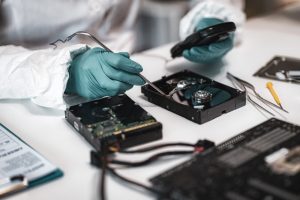(MARSHALL, Texas) – Students in Texas State Technical College’s Cybersecurity program will have another option available to make themselves more marketable starting next summer.
Students who graduate with the Associate of Applied Science degree in Cybersecurity can choose to pursue a Digital Forensics Specialist advanced technical certificate. The certificate has traditionally been offered in Waco, but an updated curriculum is being expanded to other TSTC campuses with Cybersecurity programs: Fort Bend County, Harlingen, Marshall, North Texas and Williamson County.
The Cybersecurity program is offered online, with the updated certificate program soon to follow.
“When a student logs in, they could be getting any Cybersecurity instructor statewide,” said Amy Hertel, a TSTC Cybersecurity program instructor. “We have spread out the classes so we are all a team now.”
Graduates can go on to become digital forensics analysts or forensic computer examiners, according to the U.S. Bureau of Labor Statistics. These jobs can fall under the umbrella of forensic science technicians, which had a median annual wage of $59,150 in May 2019, according to the agency.
The need for digital forensic science technicians is projected to rise nationally to about 19,600 jobs up to 2029, according to the bureau.
Some of East Texas’ larger law enforcement agencies, such as the Longview Police Department and the Tyler Police Department, have employees who work with digital forensics.
Chris Taylor, a detective at the Longview Police Department, said cybersecurity is a small part of his work. He said most of his work involves robbery and murder cases.
“Technology is designed to make our lives better, but not always easier when it comes to attempting to extract data from them in a forensically sound manner,” he said.
Dennis Mathews, a detective at the Tyler Police Department, said people entering the field should know about logical data structures used in computers and mobile devices, operating systems and file systems.
“With the increasing capacity of mobile devices and computers, the time it takes to conduct a forensic investigation can vary greatly,” he said. “Some phones have taken over nine hours to extract the data, while others only take 15 minutes. Computers with terabytes of memory can take days or weeks to extract and review the data.”
Mathews said patience and the ability to handle problems as they arise are also good qualities to have to do the work.
“Being able to extract the data from the electronic devices is the first challenging step,” he said. “Parsing and carving through the evidence is the next challenge, but totally worth it when you find the evidence needed to make a solid case or exonerate someone who is not guilty.”
The Texas Department of Public Safety’s hiring process for digital forensic science examiner jobs in the DPS Crime Lab is competitive, according to information from the agency’s media and communications office. The agency considers hiring applicants with professional experience but can train potential employees in its internal training program. The state crime lab handles cases ranging from theft to capital murder.
For more information on Texas State Technical College, go to tstc.edu.
